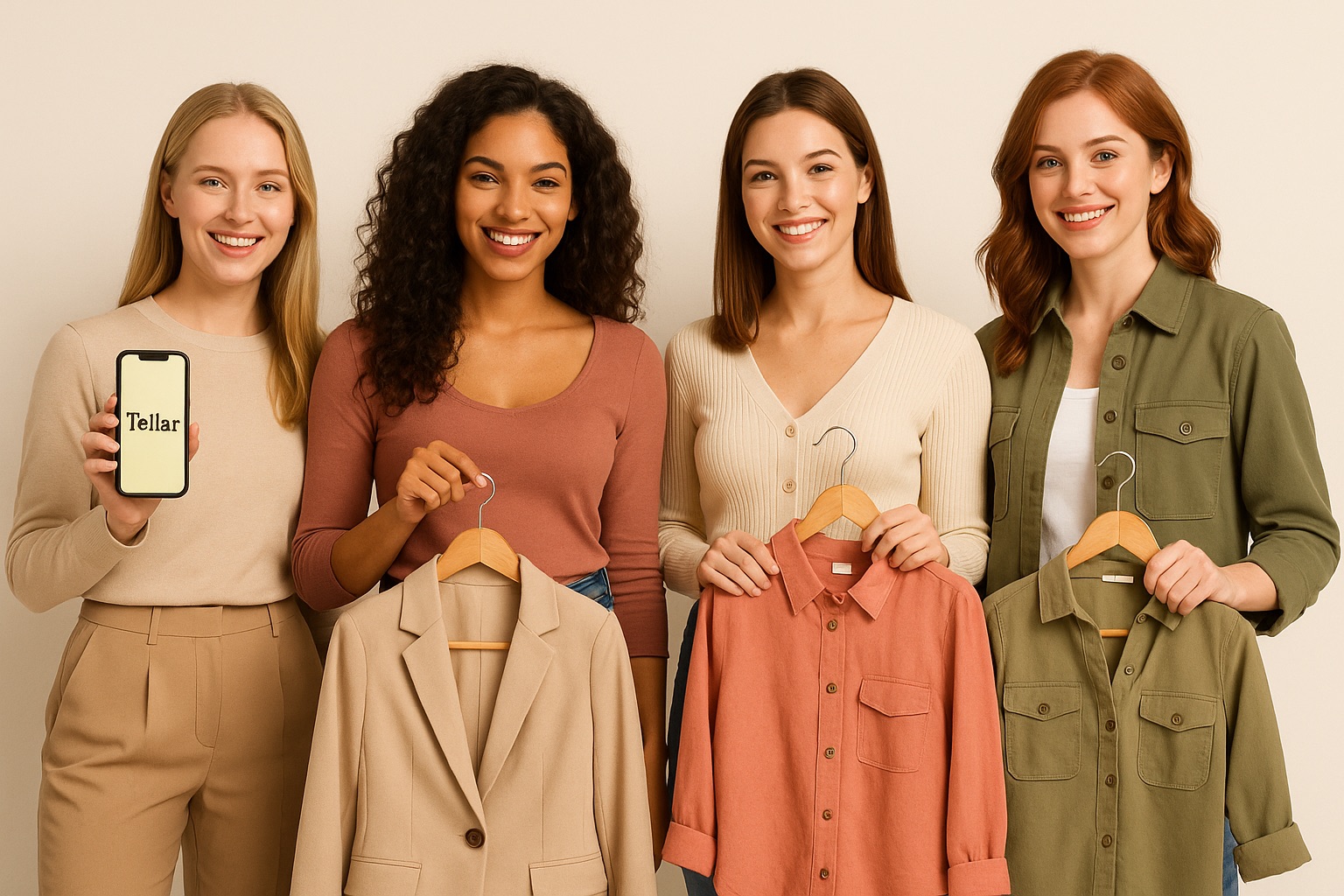Why Clothing Sizes Vary So Widely — And How Tellar.co.uk Fixes It
Author: Stylist at TellarDate: 2025
Clothing sizes are broken. A UK size 10 at Zara may fit like a UK 6 at COS and a UK 14 at H&M. For consumers, the confusion is more than inconvenient — it leads to higher return rates, poor online shopping experiences, and unnecessary waste. But what's behind the inconsistency? And how can technology like Tellar.co.uk eliminate the guesswork?
In this technical deep-dive, we’ll explain:
Why sizes vary across brands and regions
The role of vanity sizing and fit models
How brand-specific size charts work
Why traditional measurements aren’t enough
How Tellar.co.uk uses measurements to recommend real-time accurate sizes in 1,500+ brands
📏 1. The Sizing Problem: No Global Standard
One of the most fundamental reasons for size confusion is that there is no international sizing standard. Each region — and even each brand — defines sizes differently. For example:
UK Size | EU Equivalent | US Equivalent |
|---|---|---|
8 | 36 | 4 |
10 | 38 | 6 |
12 | 40 | 8 |
These conversions are only approximate. In practice, a UK 10 from one brand may be closer to a US 8, while another brand’s UK 10 might measure completely differently at the bust, waist, and hips.
🧵 2. Brands Use Different Fit Models
Clothing is designed using fit models — actual people whose body proportions influence how garments are cut and sized. But here’s the catch:
Zara’s fit models tend to have narrower hips and a slim frame
ASOS caters to more diverse body types, often with curvier fits
Reiss fits closer to luxury tailoring standards, which run smaller
This means that even if the label says "Size 10", it may be graded from completely different base measurements. Add in fabric stretch, cut (e.g. slim vs boxy), and design intent, and size becomes subjective.
👗 3. Vanity Sizing Distorts the Labels
Vanity sizing is when brands intentionally downsize the number on the label to make consumers feel thinner. For example, a 28-inch waist might be labeled as:
Size 10 at Brand A
Size 8 at Brand B
Size 6 at Brand C
This creates a false perception of fit, leading people to assume they're a smaller size than they are. While flattering in-store, this strategy causes chaos when shopping online or comparing between brands.
📈 4. The Rise of Online Shopping = More Returns
In the UK, over 40% of fashion e-commerce returns are due to sizing issues. Online shoppers often:
Order multiple sizes and return all but one
Get the wrong size due to unfamiliar brand fits
Avoid brands entirely if they’ve had previous sizing issues
This isn’t just an inconvenience — it’s an environmental and financial burden. Brands incur return costs, while consumers lose confidence in the online shopping experience.
🔎 5. Why Standard Size Charts Aren’t Enough
Even when brands publish size charts, they often:
Use ranges (e.g. Medium = 28–31 inches waist)
Round measurements up or down
Fail to specify fit intent (e.g. oversized vs tailored)
Leave out key measurement points (e.g. inseam, rise, shoulder width)
And many brands change their sizing seasonally, or between different lines (e.g. H&M Conscious vs H&M Trend).
✅ 6. How Tellar.co.uk Solves the Sizing Crisis

At tellar.co.uk, we’ve built a tool that cuts through the confusion by focusing on your actual body measurements.
How it works:
You enter your bust, waist, and hip measurements — or let us estimate them using your known size from any major store.
Our system compares those numbers against real, verified brand size charts from 1,500+ brands.
We return your correct size per brand, instantly, in cm or inches.
You get direct links to shop with confidence.
We account for:
Brand-specific grading
Regional sizing rules
Fit model proportions
International conversions
And we’re the only UK-based sizing tool that works completely free, with no hidden paywall.
🔬 7. Technical Foundations: Measurement Matching Logic
Our recommendation engine uses your largest measurement (usually hips for women, chest for men) to anchor sizing. Here’s a simplified version of the logic:
sql
CopyEdit
SELECT
If a user enters 102 cm hips, and a brand’s size chart lists:
Size M = up to 100 cm
Size L = up to 104 cm
Size XL = up to 108 cm
→ We return Size L.
This ensures a safe fit without overestimating tight sizes. We also adjust for unit (cm/in) in real time.
🛍️ 8. Practical Example: Zara vs ASOS vs H&M
Let’s say you’re shopping for trousers and your body measurements are:
Waist: 78 cm
Hips: 102 cm
Zara
Size M: Waist 76 cm, Hips 100 cm
Size L: Waist 80 cm, Hips 104 cm
→ Recommended: Size L
ASOS
Size 12: Waist 78 cm, Hips 103 cm
→ Recommended: Size 12
H&M
Size 14: Waist 79 cm, Hips 104 cm
→ Recommended: Size 14
Same person, three different sizes — Tellar.co.uk tells you each instantly, based on real data.
📲 9. How to Use Tellar.co.uk
Getting started is simple:
Visit tellar.co.uk
Measure chest, waist, hips
Search any brand with our store size lookup tool
Get your real-time size recommendation
No guessing. No returns. No frustration.
📉 10. The Future: Better Fit = Fewer Returns
With pressure mounting on fashion retailers to reduce waste, improve customer satisfaction, and enhance digital fit technology, platforms like Tellar.co.uk are the missing link.
We empower users with:
Data they can trust
Instant, actionable results
A growing ecosystem of fashion brands
Integration-ready APIs for retailers and Chrome extensions
🔗 Call to Action
🎯 Ready to stop guessing your size?
👉 Visit tellar.co.uk now and get your perfect size in over 1,500 brands — instantly and accurately.
🧵 Whether you’re shopping Zara, ASOS, COS, Reiss, H&M or Mango, we match your measurements to the real data so you get the right size first time.
The Tellar Fashion Hub is the World's Largest, 100% Free, Fully searchable, Fashion Library. Filled with 4000+ Honest & Unbiased posts, written by our expert stylists.
No adverts, no sponsored posts, no subscriptions. We are 100% free to use.
We are paid by affiliates, but we never allow brands to influence our recommendations.
Honest, Unbiased, Accurate & Free.
